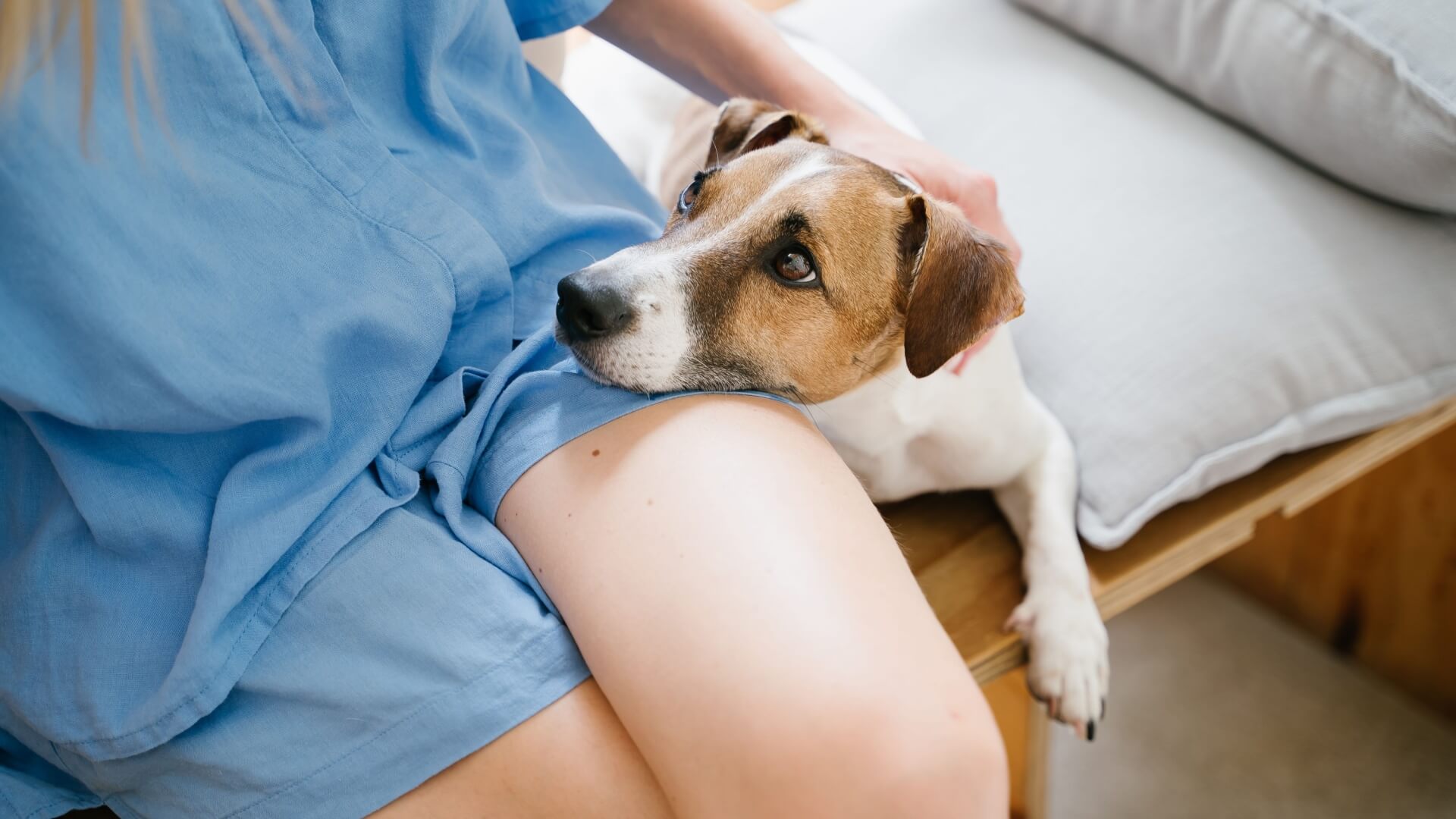May 14, 2024
Recognizing and Easing Canine Anxiety
In recent years, the awareness of canine anxiety has increased. Research shows how important it is to recognize and address concerns for the well-being of our pets. Some can tell when our dogs are anxious by observing their behaviors and signs.
This helps us understand when they need assistance. Being dog owners and pet lovers, we are attuned to our dogs’ emotions.
Gladiator K-Nine helps you spot anxiety in dogs, learn why it happens, and find ways to manage it, including solutions like the Gladiator K-Nine collar for treatment.
Signs of Anxiety in Dogs
Anxiety in dogs can manifest in various ways, ranging from behavioral changes to physical symptoms and environmental cues. Here are some key signs to watch out for:
- Change in Eating Habits: Dogs with anxiety may stop eating or eat differently. This change in eating habits is a common sign of anxiety. This could include eating too quickly, showing disinterest in food, or even guarding food without eating it.
- Excessive Licking or Grooming: Dogs often lick themselves excessively as a soothing mechanism, even when they are not stressed. When this behavior becomes excessive or compulsive, it might be a sign of underlying anxiety.
- Unusual Noises: In addition to barking or whimpering, dogs with anxiety might also make unusual noises. These include howling, yelping, or frequent growling when they are feeling stressed or anxious. This behavior will differ between breeds. Some breeds are more vocal than others.
- Pacing or Restlessness: An anxious dog may have difficulty settling down. It may start pacing, circling, or repeatedly lying down and getting up.
- Shaking or Trembling: This can be particularly noticeable during thunderstorms, fireworks, or in the presence of unfamiliar people or animals, indicating anxiety or fear.
- Escape Behavior: Dogs who attempt to escape from a yard, house, or leash but do not usually do so can demonstrate anxiety. The key is to determine if this behavior aims to avoid certain situations or stimuli.
- Changes in Bodily Functions: An anxious dog may have a higher frequency of accidents inside the house or may suffer from diarrhea or constipation due to stress. However, this is not a good indicator for dogs or puppies who are not house-trained.
- Increased Shedding: While dogs naturally shed, you may notice an increase in shedding when they are exposed to stressful situations, which is a physiological response to anxiety. This is less noticeable in long-haired breeds, whereas some short-haired breeds may develop balding spots.
- Antisocial Behavior: Seeking isolation more frequently or displaying avoidance behavior toward people or other pets can signify discomfort or anxiety.
Understanding these signs is the first step in providing the necessary support and care to alleviate anxiety in dogs and foster a healthy and happy environment for them. It is vital to note that these signs are not always consistent and may vary depending on your dog’s personality, breed, and the specific trigger of its anxiety.
Root Causes of Dog Anxiety
As with any emotional response, it is essential to identify the root cause of a dog’s anxiety. Some common triggers include:
- Lack of Socialization: Dogs that have not been adequately socialized with people or other dogs can struggle with anxiety when socialized later in life.
- Past Traumatic Experience: If a dog has experienced a traumatic event in the past, such as abuse or neglect, it may develop anxiety.
- Lack of Confidence: Dogs lacking confidence or low self-esteem may display anxious behaviors in certain situations.
- Separation Anxiety: Many dogs experience anxiety when left alone, which can lead to destructive or self-harming behaviors.
Coping With and Treating Dog Anxiety
Managing and reducing anxiety in dogs requires patience, understanding, and sometimes professional assistance. Here are some strategies to consider:
- Create a Safe Space: Ensure your dog has a comfortable, safe space that they can retreat to when they feel anxious.
- Exercise and Mental Stimulation: Regular exercise and mental stimulation through games and training can significantly reduce stress and anxiety in dogs.
- Natural Remedies and Innovative Solutions: Consider natural remedies and innovative products designed to ease anxiety. The Gladiator K-Nine collar, for example, utilizes the dog’s natural body heat to activate far-infrared ceramics. This gentle stimulation promotes relaxation and can improve a dog’s inhibitory response, easing muscle tension and enhancing calmness and well-being.
The Effects of Canine Anxiety on the Dog’s Health
Anxiety can have a significant impact on dogs, affecting all parts of their lives and even their owners. When dogs experience anxiety, it not only affects their mood but also their overall health. For instance, chronic anxiety can lead to:
- Suppressed immune function, making dogs more susceptible to diseases.
- Their eating habits may change, leading to weight loss or gain.
- The stress caused by anxiety can also exacerbate stomach issues, such as diarrhea or constipation.
The Effect of Canine Anxiety on the Bond Between Dogs and Owners
Furthermore, anxiety can strain the bond between dogs and their owners. Anxiety in pets can cause problems like chewing or barking. This can be challenging for pet owners to deal with.
Consider Gladiator K-Nine’s Dog Collar to Help Reduce Your Dog’s Anxiety
Understanding and addressing canine anxiety is vital for the health and happiness of our furry companions. With the Gladiator K-Nine collar, dog owners have access to a unique, scientifically-backed solution to help manage and reduce anxiety symptoms. This collar represents a significant step forward in canine anxiety treatment by promoting relaxation and improving training responsiveness.
If you’ve noticed signs of anxiety in your dog, we encourage you to explore the benefits of Gladiator K-Nine’s collar. It’s not just about managing symptoms—it’s about enhancing the quality of life for your beloved pet.
For more information about how Gladiator K-Nine‘s collar can help your anxious dog, don’t hesitate to reach out to us.



